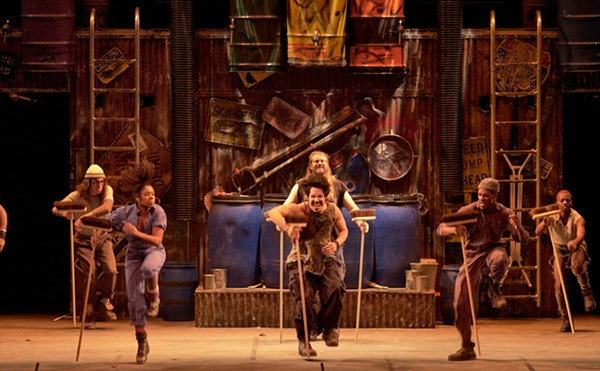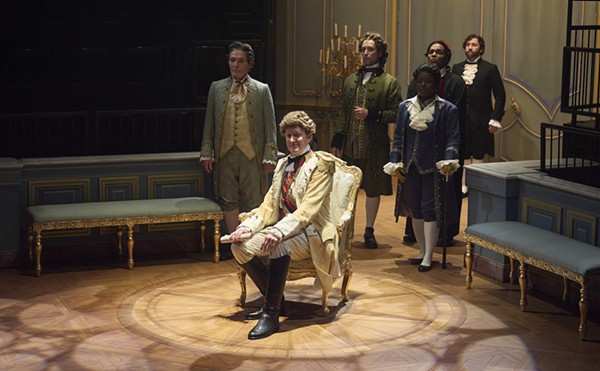Is there such a thing as a play having too good a beginning? If it's possible, a case in point might be the start of Bob: A Life in Five Acts by Peter Sinn Nachtrieb, now being produced by convergence-continuum. In this play that attempts to paint a panoramic mural of optimistic American dreams on the hoof, a baby is born in the bathroom of a White Castle burger joint in Louisville, Kentucky. On Valentine's Day.
Then, the baby boy is abandoned by his mother, Helen, and is immediately adopted by a softhearted employee, Jeanine, who names the little boy Bob and starts him off on his life journey. This initial scene, staged inventively by director Geoffrey Hoffman, captivates as Doug Kusak, who plays Bob, slips out from underneath the platform where Helen sits, creating a White Castle slider of an entirely different sort.
It's a thematically spot-on opening, with Hoffman creating the illusion of a baby by having Kusak hold a doll body up to his neck and moving its little arms and legs—a witty riff on Julie Taymor's animal puppetry in The Lion King. Turns out, though, that this boffo launch to the two-hour play is a theatrical version of the salesperson's mistake of "spilling your candy in the lobby" — expending the good stuff too soon.
In short, nothing Nachtreib writes in the rest of the play comes close to the perfection of those first scenes, as we follow Bob on his lifelong quest for "greatness." (This greatness was foreordained, you see, by a disturbingly intentional fortune cookie prediction that Jeanine read one day.) Although there are scenes and characters that work, with the five-person cast laboring as diligently as possible, the story of Bob ultimately feels like a long trip that never culminates in a satisfactory way.
Kusak projects an endearing openness and perseverance as Bob, growing through adolescence into a man who knows he's destined for great things. He knows this, even after Jeanine succumbs to an enlarged liver when he's 12 and, a bit later, when he lives in a tent behind a rest stop by a major freeway. Bob busies himself with diligently keeping the rest stop clean ("The most cared-for rest stop in the country!"), until he meets a young woman, Amelia, who has her own very specific goals in life. But she disappears too soon, after finishing her life's wish-list a bit too efficiently.
Along the way, Bob accidentally bumps into his birth father, Gunther Roy, a former animal trainer and current wastrel who sacrifices himself for his son's safety before they can bond. Indeed, Bob's life is a series of interrupted relationships that turn him into a craven materialist, living in a lush casino he won while playing roulette. But his breaking-bad moment doesn't last and soon the aging Bob is back to being his old touchy-feely self.
Nachtrieb knows how to craft funny lines. Plus, he has interesting things to say about how we Americans deal with the dreamscape this country presents us and how reality often intrudes on those dreams. But if a key rule of good writing is "kill your darlings," which means eliminating characters or scenes you love if they don't function well for the play as a whole, then all of Nachtrieb's darlings appear to be alive and well. One example: The casino where Bob finds his fortune is called the Martin Luther King-cino, the world's largest civil rights-themed casino with the blinking message: "What's Your Dream?" Sure it's funny, but come on. By being unwilling to cast aside any of his wink-wink jokes for the greater good, Bob tends to bob along on the surface instead of digging in.
As the story progresses, a chorus of four actors — Nicole McLaughlin-Lublin, Eric Sever, Katie Nabors and Robert Hawkes — poke their heads through a black curtain, singing, cooing and commenting on the proceedings. Then they come out and play multiple roles as the people who meet and influence Bob.
Each of the chorus actors have their vibrant moments: McLaughlin-Lublin as the warm Jeanine, Sever as a gay dude from Florida and as Bob's butler, Nabors as squirrely Helen, and Hawkes as a hilarious Deadhead-like stoner. But each also fails to make some of his or her other characters as sharp and distinct as they should be. It feels as if the actors are groping for an overall style of acting that never quite gels.
It's a complicated production that is choreographed well by Hoffman, with lots of odd props (an umbilical cord, for one) and quick costume changes. And some projected photos help anchor a few scenes. But perhaps more time should have been spent on shaping a raft of vivid supporting characters that could have made Bob's life more entertaining and sustainable, theatrically speaking,












